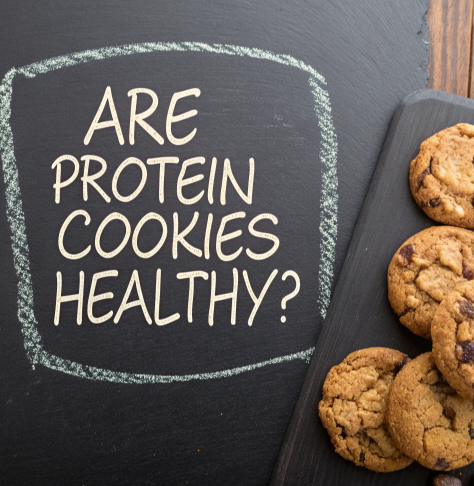Are protein cookies healthy? This cookies are a hybrid of traditional baked goods and protein-rich snacks. Made with ingredients like whey, soy, or pea protein, these cookies are marketed as a nutritious alternative. They are especially popular among athletes and busy professionals looking for an energy-boosting treat.
If you’re looking for a homemade option, check out this Protein Cookies Recipe for a guide to creating healthier versions at home.
Nutritional Profile of Protein cookies
Vary in their nutritional makeup depending on the brand and recipe. On average, one cookie contains:
- Calories: 200–300
- Protein: 15–20g
- Carbohydrates: 10–25g
- Fats: 8–15g
While they deliver a significant amount of protein, many store-bought options include added sugars and artificial ingredients to enhance flavor. To better understand the impact of such additives, you can explore this resource on added sugars.
Are Protein Cookies Really Healthy?
The Marketing vs. Reality
Brands often use buzzwords like “non-GMO,” “gluten-free,” and “high protein” to market their cookies. However, not all protein cookies align with these claims. Many contain:
- Artificial Sweeteners: These can cause digestive discomfort for some people.
- High Saturated Fats: Often used to improve taste and texture.
- Excessive Calories: Some protein cookies rival traditional cookies in caloric density.
For a better-balanced option, consider trying Protein Baked Oatmeal, which can serve as a nutritious alternative snack.
Benefits
Despite some drawbacks, protein cookies do offer benefits:
- Muscle Recovery: Their high protein content helps repair and rebuild muscles after exercise.
- Convenience: Perfect for on-the-go snacking.
- Satiation: The protein and fiber in some cookies can keep you fuller for longer.
Compared to candy bars, protein cookies generally have less sugar and a better macronutrient profile, making them a smarter indulgence.
Store-Bought Protein Cookies
While convenient, store-bought protein cookies offer a quick solution for those with busy lifestyles, but they often come with certain trade-offs. Many brands prioritize taste and shelf stability over nutritional quality, which means these cookies may not always be as healthy as they appear. Here’s a closer look at the considerations and tips for choosing the best options.
Potential Downsides of Store-Bought Protein Cookies
- Added Preservatives
To extend shelf life, many protein cookies contain artificial preservatives that may not align with a clean eating philosophy. While these ingredients keep the cookies fresh longer, some preservatives can have negative effects on gut health or trigger sensitivities in some individuals. - Excess Sugar or Artificial Sweeteners
Many store-bought options include added sugars to enhance flavor, which can undermine the health benefits of the protein content. Even “sugar-free” cookies may use artificial sweeteners like sucralose or aspartame, which can cause digestive discomfort for some people. - Unhealthy Fats
Some brands use palm oil, hydrogenated fats, or high levels of saturated fats to improve texture and flavor. These can contribute to increased calorie counts and potential health risks when consumed in excess. - Inflated Calorie Counts
Protein cookies are often calorie-dense, with a single cookie containing as much as 300 calories or more. For individuals seeking weight loss, this can add up quickly if not carefully managed.
How to Choose Healthier Store-Bought Options
To make better choices when purchasing store-bought protein cookies, consider the following:
- Check the Ingredient List: Look for short, simple ingredient lists. Avoid cookies with artificial colors, flavorings, or preservatives.
- Look for Transparent Labels: Reputable brands will list their ingredients and nutritional values clearly, avoiding vague terms like “natural flavors” without explanation.
- Low Sugar Content: Aim for cookies with less than 5g of sugar per serving. Keep an eye out for hidden sugars under names like maltodextrin, corn syrup, or fructose.
- Balanced Macronutrients: Choose cookies with at least 10–15g of protein and a good balance of fats and carbs to make them more satiating.
- Diet-Friendly Ingredients: If you have dietary preferences or restrictions, look for gluten-free, soy-free, or dairy-free options depending on your needs.
Recommended Brands to Try
Some brands excel at balancing taste and health in their protein cookies. While individual preferences vary, you might find options that meet your nutritional standards in:
- Quest Protein Cookies: High protein with low sugar and carb counts, made with natural sweeteners like erythritol.
- Naked Nutrition Cookies: Clean-label cookies with whey or plant-based protein, free of artificial additives.
- Keto-Friendly Options: Look for brands offering low-carb alternatives for those following ketogenic diets.
Pro Tip: Pair with Whole Foods
To make the most of your protein cookie, pair it with nutrient-dense foods like a handful of nuts or a serving of fresh fruit. This combination can help balance out the macronutrients and provide additional vitamins and minerals.
By paying attention to labels, choosing cookies with clean ingredients, and consuming them mindfully, you can enjoy the convenience of store-bought protein cookies without sacrificing your health goals.

